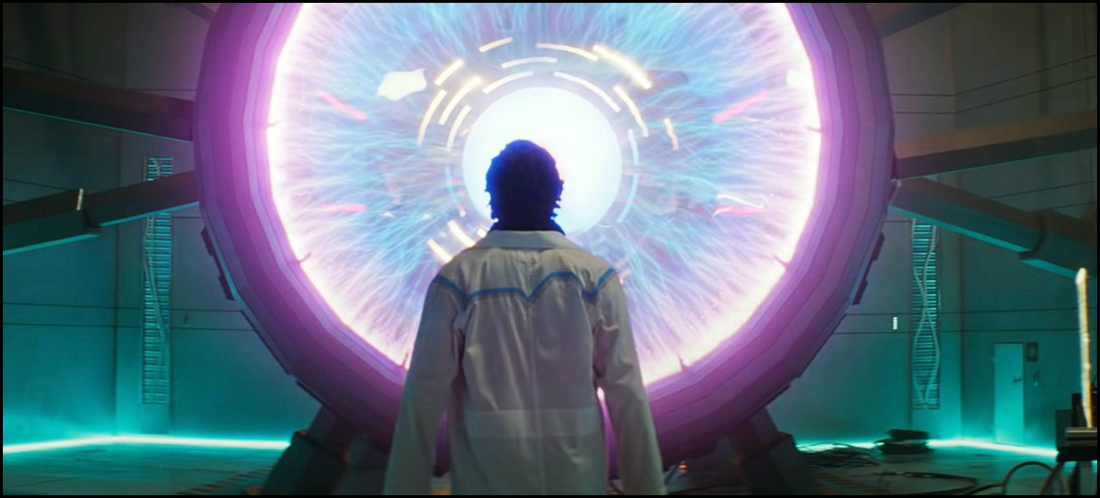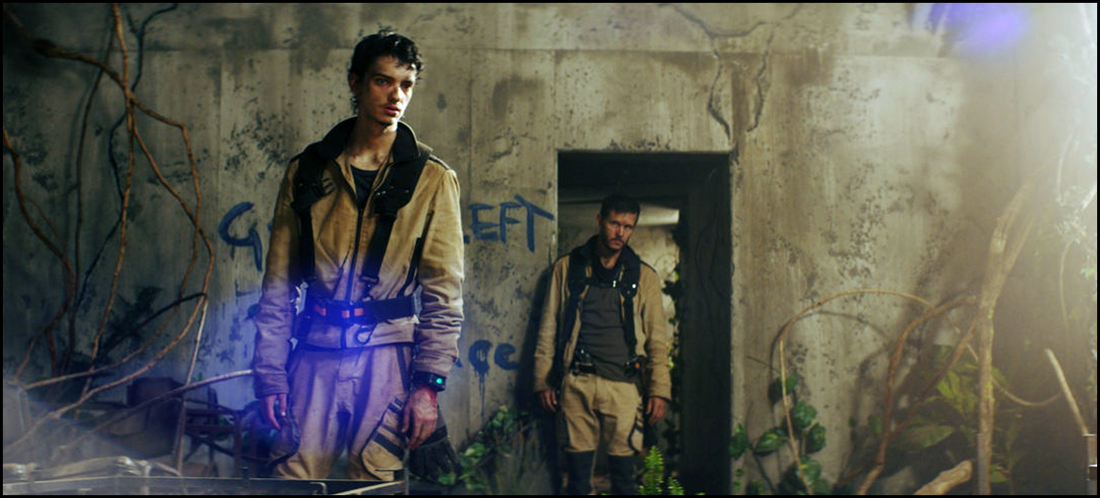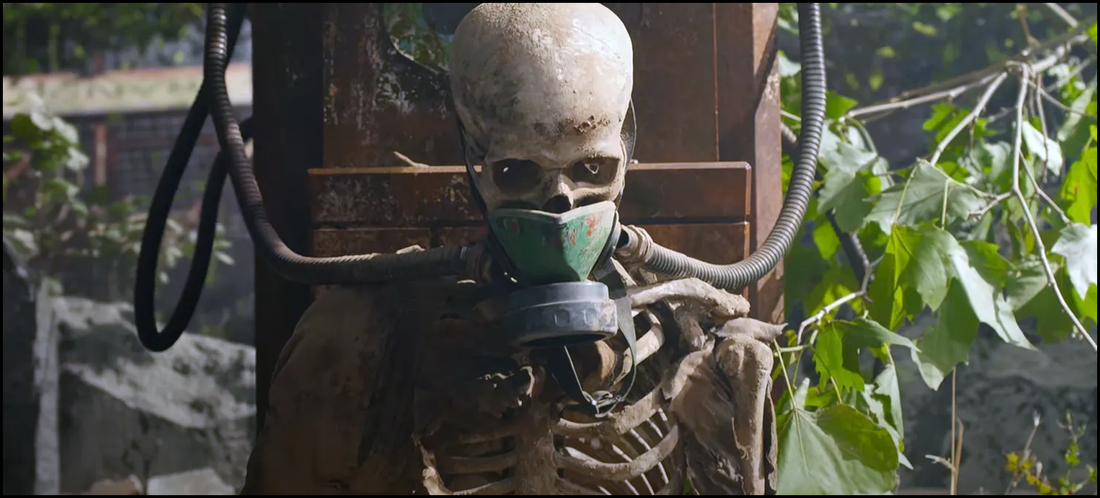Also, we get it, you Hollywood types: mankind has destroyed itself with Global Warming. Please! Enough with these stories already! And you hate technology and civilization itself, despite all of the perks (like, say, filmmaking as a craft?). And big business will be the end of us all. Enough already! Do you really have nothing more to say about the big blue marble than this? Has studio storytelling evolved to the point where its yarn-spinners really have nothing else to say other than what’s already been said countless times – countless BETTER times – in an endless stream of politically-charged SciFi features? Is everyone in the entertainment business that single-minded?
As for the story?
In the near future, mankind has somehow managed to deforest the planet, leaving oxygen itself a scarce commodity. One of the last surviving corporations – Chronicorp – has bought the remaining citizens of Australia a brief respite: their manufactured synthetic oxygen gives survivors the chance to carry on … but it turns out the tainted gas will eventually kill every last man, woman, and child. Earth’s last hope is Chronicorp’s time machine – the Chronicom – where hopes for a trip to the future will produce a cure for the present. But once activated, the machine receives a cryptic communication from four hundred years down the line: “Send Ethan Whyte.”
Ethan Whyte (played by Kodi Smit-McPhee) is a worker toiling away in the tunnels under the city working to keep the power running. Soon, he’s whisked to Chronicorp Headquarters where CTO Regina Jackson (Deborah Mailman) explains that Ethan’s late father, Richard (Aaron Glenane), built the Chronicom, and now the company needs the son to head to the future to not only find the much needed solution but also find his own way back to the present. Already living a life weighted down with daddy issues (Richard apparently bailed out on his marriage years before), Ethan eventually decides that in order to save his dying wife Xanthe (Sana’a Shaik) he’ll do as Chronicorp asks.
In the future, plant life has returned to Earth, seemingly of its own accord, but we’re never convincingly told how or why. (It would seem that Mother Nature was just waiting for mankind to magically die off.) Ethan’s ongoing family issues push him to make one bad decision after another as the character vacillates far too often between understanding ‘what happened,’ ‘what’s this,’ and ‘why am I here?’ Eventually added to this jumbled storytelling is Jude (Ryan Kwanten), Ethan’s friend, substitute father figure, and maybe even executioner. Jude follows our hero into the future, though once arrived he spends the bulk of the time emotionally struggling with his own secrets and demons, none truly revealed until the big finish at which point it all feels more like a failed plot twist than it does a legitimate storytelling development. (There was probably a better way to reveal all of this information, but alas I can only review what’s provided on film.)
And while I’m on the subject of pointing out things that don’t quite make sense, why would a company like Chronicorp be spending what’s left of Earth’s natural resources on perfecting a time machine in the first place? Why not take all of that sweat, blood, and tears and put it into creating something like – say – synthetic plant life? I know an Earth government or two has set up some seed vaults in the event of the Apocalypse – which this most definitely is – so why not dig deep on that frontier? How would Mother Earth just turn itself off? And how did Chronicorp know that the answer to what ails mankind would even be found in the distant future? I understand how going back to the past – zipping back to pick up a plant or two – could be useful, but if Earth was as dead as depicted in the film’s set-up, why would anyone assume going to the future would be a solution? To complicate matters further, 2067 doesn’t explain how Ethan uses only a fateful few seconds to eventually provide the past with his pretty-darn-simple resolution: I won’t spoil it for you (I do try to be respectful of keeping a surprise or two secret in my reviews), but this one had me scratching my head. When you have to ‘think up an answer,’ there’s usually a problem that should’ve been hammered out by the narrative instead of the audience.
Trust me when I say that I had a solid handful of additional questions regarding little things that didn’t make sense (I reached a point where I just stopped jotting them down out of personal frustration), but I don’t like the belabor a point when I think it speaks for itself. Larney’s script had holes – some big, some small – and I can’t help but wonder if another director taking charge might’ve been the better course of action here. If nothing else, a second opinion could’ve helped identify these deficiencies and helped make for a tighter experience.
There’s nothing wrong with wanting to make an impactful Science Fiction film. In fact, I’d argue that SciFi – unlike other genres – has the ability to transcend its rudimentary framework more than traditional drama or comedy because these features require their own world-building. They set up their own context with their own language and circumstances, and they tell stories entirely with their own set of rules. But when the formula doesn’t add up, the film’s message ends up being shortchanged in the process. No amount of good intentions behind that morality tale resolves the narrative inconsistencies, and the hero’s quest loses its ‘umph’ in the finale.
Still, I’d say 2067 is mildly recommended.
The thing I enjoy about these smaller, quieter, less well-known features is that there’s generally a lot of moxie behind them. Typically, smaller production companies are populated by folks with an unquenchable desire to make movies – good, bad, and sometimes awful – and it’s that desire that ends up giving nearly all of them just a bit more heart and soul than your typical run-of-the-mill, big-loud-dumb-fun summer blockbuster. Smaller films have to work harder to find an audience. Heck, they have to work harder to even get made! While 2067 has its share of flaws, it’s still worth a single view (in my opinion), though I suspect some will be restless in their seat before all is said and done.
Despite some solid production values and a reasonably good performance by the lead (plus a very impressive musical score), 2067 feels empty: the science doesn’t quite make sense (at least not to this viewer), the relationships feel too formulaic to be accepted as authentic, and the endgame strategy by the flick’s big baddie has more plot holes than perhaps one two-hour feature could fill. All of this and the fact that the film plods along at a snail’s pace once again makes me long for the days when directors were directors, writers were writers, and rarely the two would meet.
In the interests of fairness, I’m pleased to disclose that the fine folks at RLJE Films provided me with a DVD of 2067 for the expressed purposes of creating this review; and their contribution to me in no way, shape, or form influenced my opinion of it.
-- EZ





 RSS Feed
RSS Feed